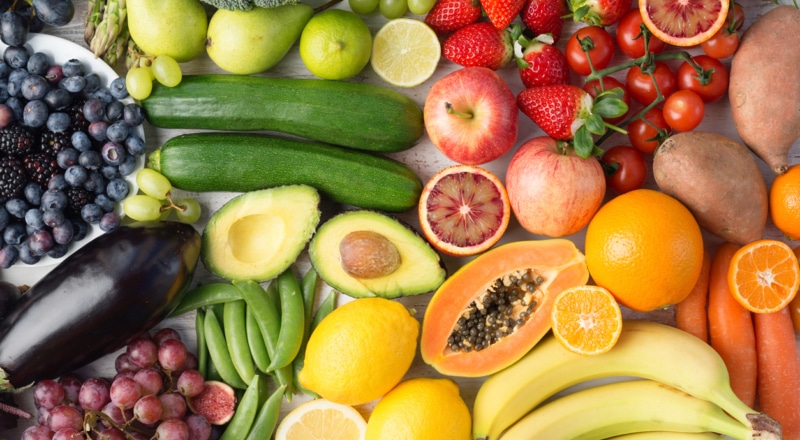Achieving a balanced diet with the food pyramid
Eat a variety of different foods to make sure your diet is balanced

Eating a healthy mixture of foods doesn’t mean that you have to buy exotic or expensive food to add variety to your diet. Cheap seasonal and traditional food is just as good. So when shopping, make sure to buy lots of fruit and vegetables, potatoes, rice and starches, fish, meat, eggs, beans and some dairy products. That’s all it takes to have a healthy balanced diet!
Check out the food groups below, they contain all the nutrition you need to stay fit, healthy and looking good! Don’t forget to try and eat different foods every day and to be brave when trying new food. Use the food pyramid to plan your healthy food choices every day and watch your portion size.
Fruit and vegetables
- You’ve been hearing it all your life: eat at least five portions of fruit and vegetables a day. This food group gives your body vitamins, minerals and fibre.
- A portion can be a bowl of salad, a side plate full of carrots, peas or tomatoes, a small glass of fruit juice, an apple, an orange or a handful of grapes. So, packing in at least five portions a day shouldn’t be so difficult!
- Get into the habit of eating at least one portion of fruit or vegetables with every meal.
- You need a variety of fruit and vegetables, so add different colours to your dinner plate or lunch.
- You can have fresh, frozen, tinned or dried fruit and veg. Try to make sure that no salt or sugar has been added. Homemade vegetable soups and pasta sauces also count.
- It’s terrible but potatoes don’t count as one of your vegetable portions. They are classified as a carbohydrate food like bread and rice.
- You can’t survive on vitamin tablets: fruit and vegetables are full of fibre, they’re an essential part of our diet.
Bread, potatoes and cereals
- These are cheap and cheerful. This food group gives your body most of its energy and you need the fibre to make sure you don’t get constipated! They also give us some vitamins and minerals.
- Foods included in this group include breakfast cereals, all breads and rolls, potatoes, noodles, pasta, rice and couscous.
- Try to get at least three – five portions of these every day. If you are less active you will need fewer portions, but those who are highly active will need more. A portion can be a bowl of cereal (avoid the sugary types), a slice of bread or a medium sized potato.
- Potatoes are cheap, easy to cook, low in fat, and can be used in lots of dishes. Choose potatoes more often than pasta and rice.
- Choose high in fibre foods such as wholemeal bread or brown rice instead of white bread or rice.
Dairy products (Milk, Yoghurt, and Cheese)
- Dairy products provide your body with calcium, magnesium, phosphorous and vitamin D, which are essential for healthy bones, teeth, nails, muscles and nerves.
- Low-fat milk, yoghurt, and cheese provide all the healthy benefits of dairy but with fewer calories. Choose low-fat where possible.
- Try to get three portions of dairy products a day. A portion can be a carton of yoghurt, a small amount (match box size) of cheese or a glass of milk.
- Drinking a pint of milk every day means that you get your daily recommended amount of calcium.
- Cheese is higher in saturated fat and salt when compared to milk and yoghurt. Choose milk and yoghurt more often than cheese.
Fish, eggs, lean meat, poultry (chicken, turkey and so on) nuts, soya, tofu, beans and pulses
- These are your protein providers. Protein is essential to help the body repair itself and grow. These foods also give us vitamins and minerals (such as iron).
- Vegetarians should make sure that they eat plenty of beans, pulses, and protein alternatives such as soya and tofu.
- Try to eat two portions of the protein providers every day.
- Whenever possible grill, boil, bake or stir fry these foods in as little fat as possible.
Fats and Oils
- Fat is an essential part of a healthy body so don’t try to cut it out of your diet completely. However the problem with these foods is that we often eat too many of them and risk becoming overweight.
- Included in this food group are butter, margarine, sugary drinks, chocolate, crisps, sweets, chips, cream, mayonnaise, cakes, buns and pies.
- Fat and sugar give us energy but we only need a very small amount of this food group.
- Use oils and butter as lightly as possible in your eating. Grill, bake, boil or stir fry food instead of traditional frying.
- You don’t need to munch crisps, chips and donuts to get fat in your diet. Dairy products, meat and fish all provide the fat needed to keep us healthy.
Sugary foods
- Sugar gives us energy but no other nutrition.
- Sugary foods damage our teeth.
Some content thanks to YouthHealthNE authors and the Community Nutrition & Dietetic Service of the Health Promotion Department, HSE Dublin North East.
Need more information, advice or guidance?
We offer information, advice and guidance about the issues that matter to you. Our online Youth Information Chat service is for 16 to 25 year olds and is available Monday to Friday, 4pm to 8pm (excluding Bank Holidays).






